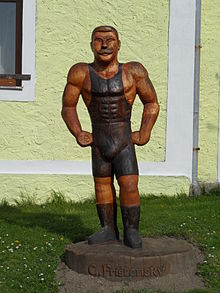Gustav Frištenský
Gustav Frištenský (born May 7, 1879 in Kamhajek , Bohemia , † April 4, 1957 in Litovel ) was a Czech wrestler and European champion of amateurs and professional wrestlers.
biography
Frištenský was one of seven children of a small Bohemian farmer in the Austro-Hungarian Empire. He grew up in his birthplace and as a child had to work hard on his parents' farm. At the age of 14 he started an apprenticeship as a blacksmith, but after an accident at work he changed his profession and learned the trade of a butcher. After his apprenticeship he worked in Kolín and Brno . In Brno he began to work as a gymnast and as a light and heavy athlete in the “Sokol” sports club. In the process, he grew into a stately, magnificently built athlete who took part in wrestling competitions in Brno, Prague and Vienna from 1898 .
In 1903 Frištenský was Austrian champion and participated in the same year at European championships in the Greco-Roman style in Rotterdam . At that time, these championships took place without any weight classification. Frištenský showed in Rotterdam excellence and was Hans-Heinrich Egeberg from Denmark , Joseph seal , Belgium , Philip de Haas , Belgium, Otto Grandpaier and Karlshochschule from the German Reich European champion .
In 1903 Gustav Frištenský, who was 1.80 m tall and weighed about 100 kg, took part in a world championship body and beauty competition in Vienna and took 1st place there. He can therefore be called one of the ancestors of modern bodybuilding.
Frištenský also performed well in weightlifting. He is said to have pushed 140 kg with both arms.
In 1906 Frištenský became a professional wrestler. He initially stayed in Europe and won a tournament in Vienna in 1909. He later went to South America and the USA . He also fought in free style there. a. at Madison Square Garden in New York City , Chicago , Boston and Montreal . Some of the opponents he hit in the process were Andre Anderson, Victor Soldat, Joe Geshot, Marty Cutler and Joe Wallace.
In 1913 Gustav Frištenský fought against Stanislaus Cyganiewicz from Poland in Vienna and lost to this after 45 minutes.
During the First World War he fought as an artilleryman in the Austro-Hungarian Army.
In 1929 Gustav Frištenský was European champion of professional wrestlers in Greco-Roman style in Prague ahead of Leskinowitsch, Latvia , Pinetzki, Poland , Jirsa, Czechoslovakia , Orloff, Russia , Karsch and others. Bahn, both Germany.
During the German occupation he survived a period of imprisonment in a concentration camp and worked as a professional wrestler until 1951 after the Second World War.
In 2015 an asteroid was named after him: (24967) Frištenský .
swell
- "The modern wrestling", textbook on wrestling with a historical appendix by A. v. Guretzki, Verlag FW Gloeckner & Co., Leipzig, 1922,
- Trade journal "Athletics" No. 21, page 4 from 1929,
- Sandow Museum website
Web links
- Gustav Frištenský's profile at the Institute of Applied Training Science
- Portrait of Gustav Fristensky with some pictures (English)
| personal data | |
|---|---|
| SURNAME | Frištenský, Gustav |
| BRIEF DESCRIPTION | Czech wrestler |
| DATE OF BIRTH | May 7, 1879 |
| PLACE OF BIRTH | Kamhajek , Bohemia |
| DATE OF DEATH | April 4th 1957 |
| Place of death | Litovel |

